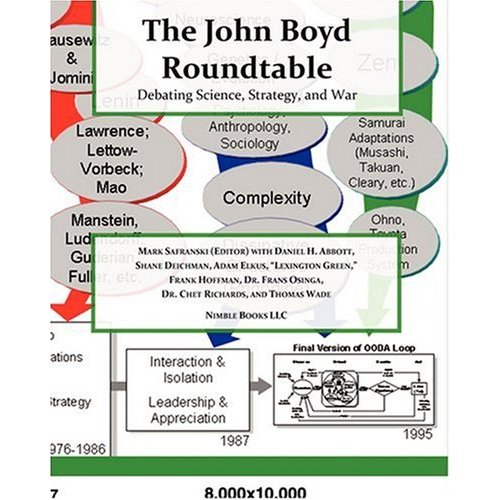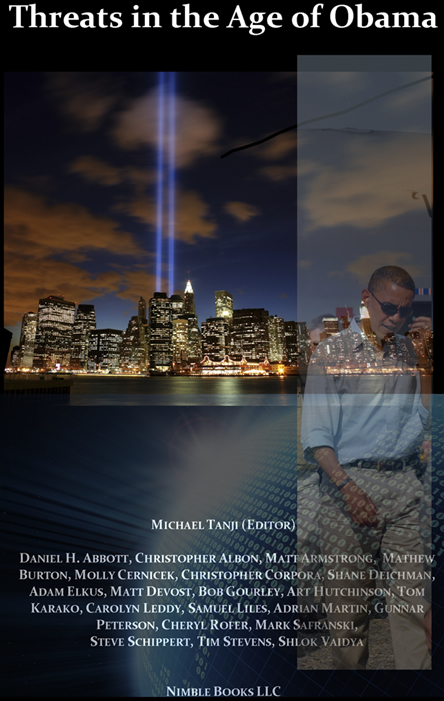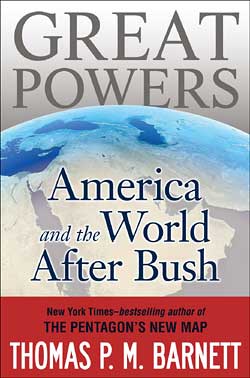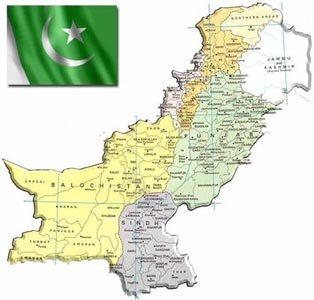Archive for December, 2009
Stocking Stuffers……
Saturday, December 12th, 2009In a burst of raw self-interest – and also a little love for my blogfriends – these books make nifty gifts for any war nerd or deep thinker on your Christmas list:

The John Boyd Roundtable: Debating Science, Strategy, and War – Mark Safranski (Ed.)




Threats in the Age of Obama – Michael Tanji (Ed.)
Great Powers: America and the World After Bush – Thomas P.M. Barnett
Brave New War: The Next Stage of Terrorism and the End of Globalization – John Robb
Science, Strategy and War: The Strategic Theory of John Boyd – Frans Osinga




The Genius of the Beast: A Radical Re-Vision of Capitalism by Howard Bloom
Intelligence and How to Get It: Why Schools and Cultures Count by Richard Nisbett
Inside Cyber Warfare: Mapping the Cyber Underworld by Jeffrey Carr
This Is for the Mara Salvatrucha: Inside the MS-13, America’s Most Violent Gang by Samuel Logan
Full Disclosure:
In copmpliance with new Federal regulations of dubious Constitutional merit, I hearby declare ZP does not accept money for publishing reviews or any paid advertising. Courtesy review copies were extended to me by authors or publishers acting on behalf of Sam Logan, Tom Barnett and Jeff Carr. I edited the first book in this post and was a contributing author to the second one. All of the books, with the exception of Cyber Warfare have been the subject of prior reviews or posts at ZP.
Nixon vs. The Neoconservatives?
Friday, December 11th, 2009 
Some interesting, if oddly interpreted, background at HNN on Fritz Kraemer, the influential hardliner and intellectual mentor of Henry Kissinger and Al Haig, and Kraemer’s influence in American foreign policy:
Luke A. Nichter: Who Was Fritz Kraemer? And Why We Should Care.
Whether Vietnam, Iraq, or now Afghanistan, wars come and go, but the real battle is a philosophic one between two sects of conservatives. In The Forty Years War: The Rise and Fall of the Neocons from Nixon to Obama, authors Len Colodny and Tom Shachtman challenge readers to examine the role of a little-known Pentagon figure named Fritz G.A. Kraemer. Colodny
and Shachtman argue that Kraemer was the leading intellectual behind what became known as the neo-conservative movement, witnessed by the fact that Kraemer influenced so many high-ranking conservative figures over the course of six decades.….This meeting was probably the only one to have occurred during the Nixon presidency in which Nixon and Kissinger permitted a rigorous debate, in the Oval Office no less, over the merits of not just Vietnam policy, but Nixon foreign policy more generally. Kraemer knew the issues well enough that both Nixon and Kissinger were forced to defend themselves to someone who represented an increasingly disenchanted sect of conservatives. Kraemer believed, as other conservatives did, that the conduct of Nixon foreign policy had became tainted by short-term political considerations, and that politicians had acted as a restraining influence on military leaders who believed they were capable of achieving a military victory..
….At the heart of the dance was a fundamental philosophic difference between Kraemer’s ideologically purist, militarist, anti-diplomacy stance, and Nixon’s quintessential pragmatic stance. Kissinger and Haig were caught between these antipodal poles. Kraemer had “discovered” Kissinger in 1944 at Camp Claiborne, had superseded his goal of becoming an accountant and readied him intellectually for Harvard. As Kissinger would later acknowledge, “Kraemer shaped my reading and thinking, influenced my choice of college, awakened my interest in political philosophy and history, inspired both my undergraduate and graduate theses and became an integral and indispensable part of my life.” In the Pentagon in 1961, Kraemer had similarly discovered Haig, and recommended him for greater responsibilities in the office of Secretary of Defense Robert McNamara. At the moment of entering the White House in 1969, both Kissinger and Haig subscribed largely to Kraemer’s tenets.…..There’s much more to the story of this quartet, including Haig’s efforts to push Nixon up the plank toward resignation, and how those who detested Nixon’s foreign policies became the neocons in the Ford and Carter years, when they continued and magnified their efforts to undermine those presidents’ Nixonian foreign policies.
The two articles have a lot of interesting snippets of information but I am finding the ideological spin to be strange. The neoconservatives moved from the Left to the Right, starting roughly in this period, but they would not be identifiably so until the mid to late 1970’s. Nor are most of the conservative figures like Alexander Haig in the neoconservative group. When Haig was Secretary of State under Ronald Reagan, his relationship with the administration’s actual neoconservatives like Jeanne Kirkpatrick was very poor ( they were also poor with the administration’s moderates). The authors, in my view, are also overestimating Kraemer’s influence on Richard Nixon, who entered office with a firm vision of his foreign policy objectives.
Nevertheless, of serious interest to the Nixon scholar.
None Dare Call it a Rogue State
Wednesday, December 9th, 2009
Reader Isaac, points to an excellent analytical overview of Pakistan’s national nervous breakdown at Dawn.com, by Nadeem F. Paracha. It is a lengthy but stupendous post with some 200 + comments:
There is nothing new anymore about the suggestion that over a span of about 30 odd years, the Pakistani military and its establishmentarian allies in the intelligence agencies, the politicised clergy, conservative political parties and the media have, in the name of Islam and patriotism, given birth to a number of unrestrained demons which have now become full-fledged monsters threatening the very core of the state and society in Pakistan.
A widespread consensus across various academic and intellectual circles (both within and outside Pakistan), now states that violent entities such as the Taliban and assorted Islamist organisations involved in scores of anti-state, sectarian and related violence in the country are the pitfalls of policies and propaganda undertaken by the Pakistani state and its various intelligence agencies to supposedly safeguard Pakistan’s ‘strategic interests’ in the region and more superficially, Pakistan’s own ideological interest.
….The 1980s and the so-called anti-Soviet Afghan jihad is colored with deep nostalgic strokes by the Islamists and the military in Pakistan. Forgetting that the Afghans would have remained being nothing more than a defeated group of rag-tag militants without the millions of dollars worth of aid and weapons that the Americans provided, and Zia could not have survived even the first MRD movement in 1981 had it not been due to the unflinching support that he received from America and Saudi Arabia, Pakistani intelligence agencies and its Afghan and Arab militant allies were convinced that it was them alone who toppled the Soviet Union.
The above belief began looking more and more like a grave delusion by the time the Afghan mujahideen factions went to war against one another in the early 1990s and Pakistan was engulfed with serious sectarian and ethnic strife. But the post-1971 narrative that had now started to seep into the press and in many people’s minds, desperately attempted to drown out conflicting points of views about the Afghan war by once again blaming the usual suspects: democracy, secularism and India.
Many years and follies later, and in the midst of unprecedented violence being perpetrated in the name of Islam, Pakistanis today stand more confused and flabbergasted than ever before.
The seeds of the ideological schizophrenia that the 1956 proclamation of Pakistan being an ‘Islamic Republic’ sowed, have now grown into a chaotic and bloody tree that only bares delusions and denials as fruit.
Read the rest here.
There has been an ocean of ink spilled about the Obama administration’s Hamlet-like deliberation over a war strategy for Afghanistan and on the implications of agreeing to 30,000 rather than the 40,000 new troops for the “Afghan Surge”, as Gen. McChrystal had originally requested. The 10,000 difference in boots is not the salient strategic point, though it is the one that excites political partisans on the Right, Left and anti-war Far Left. It also distracts us from debating our fundamental strategic challenge.
The horns of our dilemma is that our long time “ally” whom we have hitched ourselves to in a grand war effort against revolutionary Islamist terrorism is not our ally at all, but a co-belligerent with our enemy. By every policy measure that matters that causes the United States – justifiably in my view – to take a tough stance against North Korea and Iran, applies in spades to Islamabad. Yet none dare call Pakistan a rogue state.
It is the elephant in our strategy room – if the elephant was a rabid and schizophrenic trained mastodon, still willing to perform simple tricks for a neverending stream of treats, even as it eyes its trainer and audience with a murderous kind of hatred. That Pakistan’s deeply corrupt elite can be “rented” to defer their ambitions, or to work at cross-purposes with Pakistan’s perceived “interests”, is not a game-changing event. Instead, it sustains and ramps up the dysfunctional dynamic we find ourselves swimming against.
We play a bizarre game, our leaders being more concerned about Pakistan’s “stability” than Pakistan’s own generals and politicians who egg on, fund and train the very militant Islamist groups spreading death and chaos inside Pakistan and beyond its borders. Why can we not find Osama bin Laden or Mullah Omar ? Because they are high value clients of the ISI which is no more likely to give them up than the KGB was to hand over Kim Philby.
Until America’s bipartisan foreign policy elite grapple with the fact – and it is an easily verifiable, empirical, fact – that Pakistan’s government is in chronic pursuit of policies that destabilize Central Asia, menace all of Pakistan’s neighbors, generate legions of terrorists and risk nuclear war with India, no solutions will present themselves.
A strategy will only have a chance of success when it is grounded in reality.
Telestai
Wednesday, December 9th, 2009The unpleasant outside project that I have been working on for the past year and the last month and a half in particular is finished and put to bed forevermore! It’s a relief to have a large chunk of my time back which I can now use to blog more often, to relax and to catch up on my Antilibrary which has swollen to a vast pile of sixty five unread books, many of which are relatively “current”. I’ve already started digging in to them and I’m going to return to my formerly rigorous exercise regime that has slowly dwindled under the weight of more sedentary commitments. I have two ideas for some writing projects that I am going to pursue now even as my posting velocity here at ZP will increase in the coming weeks.
I’d also like to take a moment to thank Charles Cameron and J. Scott Shipman for stepping up and guest posting here in November – it was a great help to have them writing some excellent posts precisely when I had the least amount of time to create my own. Much appreciated gents!


